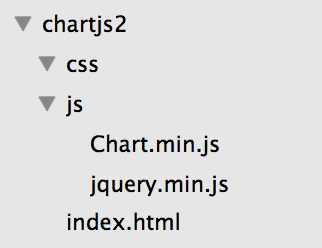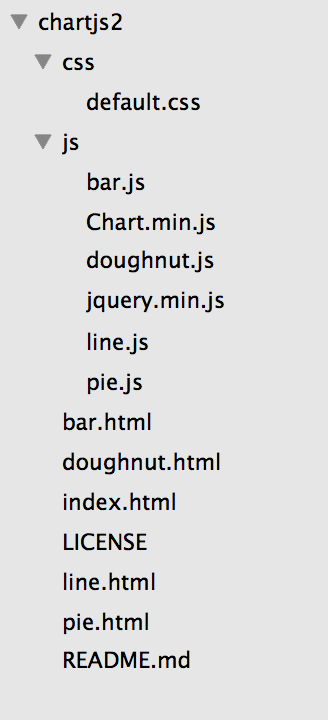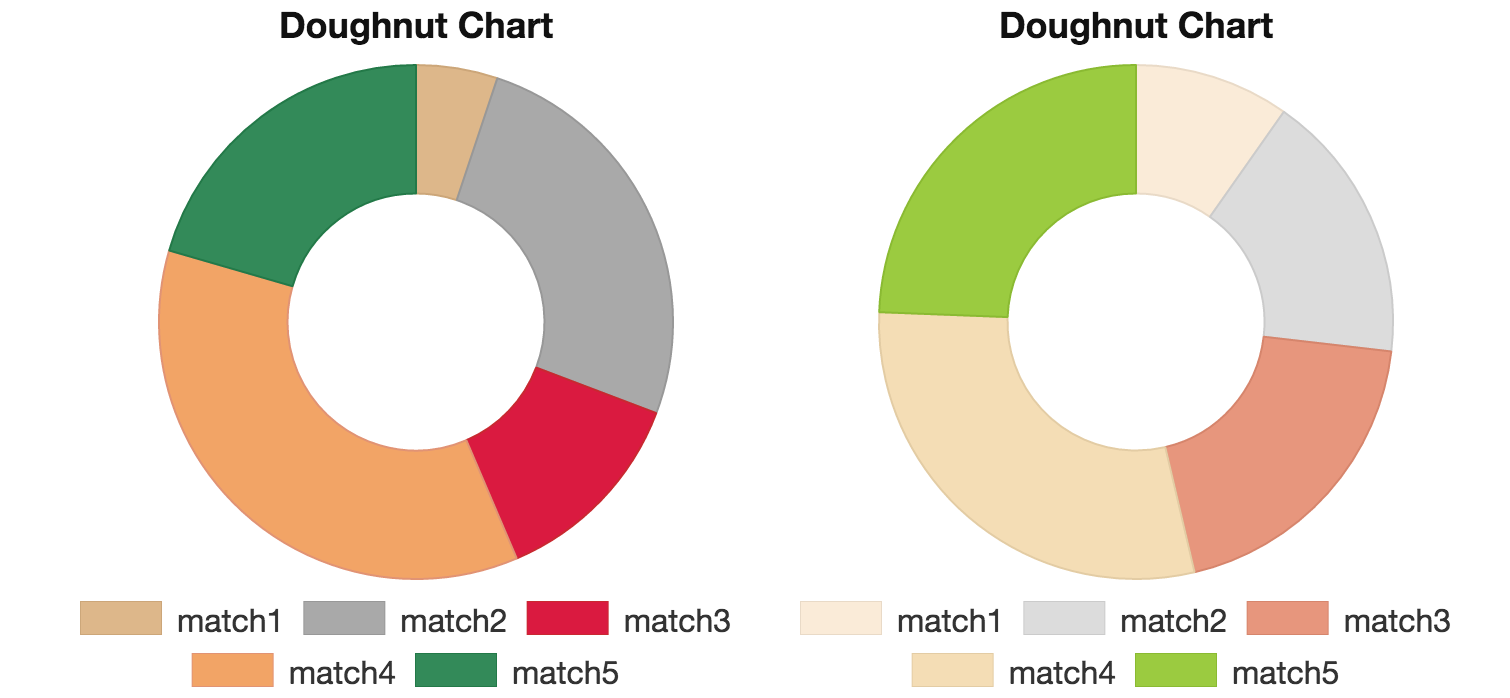
How to create a doughnut chart using ChartJS
ChartJS
In this tutorial we will learn to draw doughnut chart using ChartJS and some static data.
Using ChartJS 2.x Download
Note! You can get the code of this tutorial from my GitHub repository.
Task
We will create a doughnut chart for two teams namely, TeamA and TeamB and their score for 5 matches - match1, match2, ... match5.
Project structure
We will start with the following project structure.

Inside the css folder we will create a default.css file. This will contain the default stylesheet.
And inside the js folder we will create doughnut.js file. In this file we will be writing the code to create the doughnut graphs.
And inside the project folder we will create a doughnut.html file.
Now the project structure will look like the following.

There are some other files shown in the above image from my other tutorials.
This tutorial is similar to Pie Chart tutorial.
doughnut.html
<!DOCTYPE html>
<html>
<head>
<title>ChartJS - Doughnut</title>
<link type="text/css" rel="stylesheet" href="css/default.css" />
</head>
<body>
<div class="chart-container">
<div class="doughnut-chart-container">
<canvas id="doughnut-chartcanvas-1"></canvas>
</div>
<div class="doughnut-chart-container">
<canvas id="doughnut-chartcanvas-2"></canvas>
</div>
</div>
<!-- javascript -->
<script src="js/jquery.min.js"></script>
<script src="js/Chart.min.js"></script>
<script src="js/doughnut.js"></script>
</body>
</html>
default.css
The default.css file will contain the following.
.chart-container {
width: 80%;
height: 480px;
margin: 0 auto;
}
.pie-chart-container,
.doughnut-chart-container {
height: 360px;
width: 360px;
float: left;
}
JavaScript
To draw the doughnut chart we will write some javascript.
Canvas
First we will get the two canvas using their respective ids doughnut-chartcanvas-1 and doughnut-chartcanvas-2 by writing the following code.
//get the doughnut chart canvas
var ctx1 = $("#doughnut-chartcanvas-1");
var ctx2 = $("#doughnut-chartcanvas-2");
Options
This is similar to Pie Chart options.
//options
var options = {
responsive: true,
title: {
display: true,
position: "top",
text: "Doughnut Chart",
fontSize: 18,
fontColor: "#111"
},
legend: {
display: true,
position: "bottom",
labels: {
fontColor: "#333",
fontSize: 16
}
}
};
Data
This is similar to Pie Chart data.
Instantiate the Chart class
We create two variables chart1 and chart2 and instantiate the Chart class. We pass ctx1 and ctx2 which holds the canvas and the data object.
Our final code for the doughnut.js file
$(function(){
//get the doughnut chart canvas
var ctx1 = $("#doughnut-chartcanvas-1");
var ctx2 = $("#doughnut-chartcanvas-2");
//doughnut chart data
var data1 = {
labels: ["match1", "match2", "match3", "match4", "match5"],
datasets: [
{
label: "TeamA Score",
data: [10, 50, 25, 70, 40],
backgroundColor: [
"#DEB887",
"#A9A9A9",
"#DC143C",
"#F4A460",
"#2E8B57"
],
borderColor: [
"#CDA776",
"#989898",
"#CB252B",
"#E39371",
"#1D7A46"
],
borderWidth: [1, 1, 1, 1, 1]
}
]
};
//doughnut chart data
var data2 = {
labels: ["match1", "match2", "match3", "match4", "match5"],
datasets: [
{
label: "TeamB Score",
data: [20, 35, 40, 60, 50],
backgroundColor: [
"#FAEBD7",
"#DCDCDC",
"#E9967A",
"#F5DEB3",
"#9ACD32"
],
borderColor: [
"#E9DAC6",
"#CBCBCB",
"#D88569",
"#E4CDA2",
"#89BC21"
],
borderWidth: [1, 1, 1, 1, 1]
}
]
};
//options
var options = {
responsive: true,
title: {
display: true,
position: "top",
text: "Doughnut Chart",
fontSize: 18,
fontColor: "#111"
},
legend: {
display: true,
position: "bottom",
labels: {
fontColor: "#333",
fontSize: 16
}
}
};
//create Chart class object
var chart1 = new Chart(ctx1, {
type: "doughnut",
data: data1,
options: options
});
//create Chart class object
var chart2 = new Chart(ctx2, {
type: "doughnut",
data: data2,
options: options
});
});
Output

ADVERTISEMENT